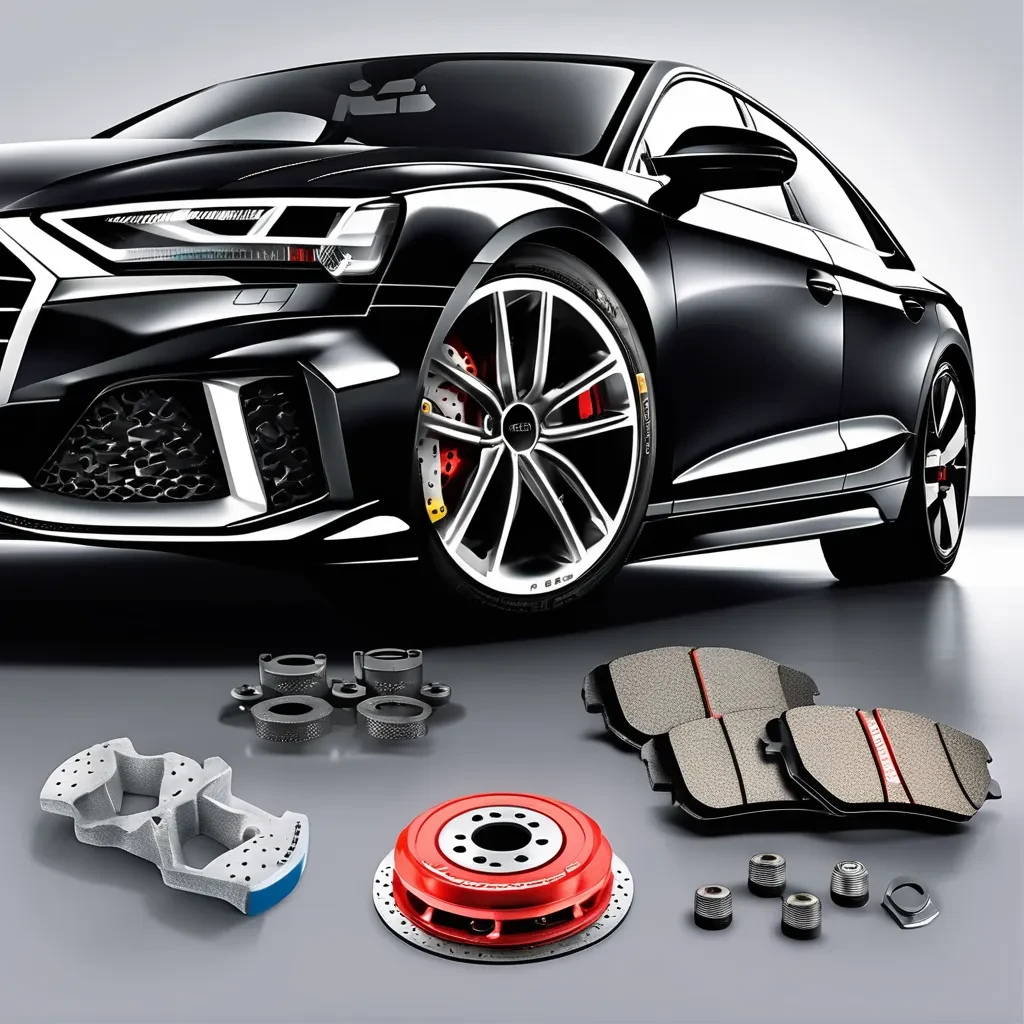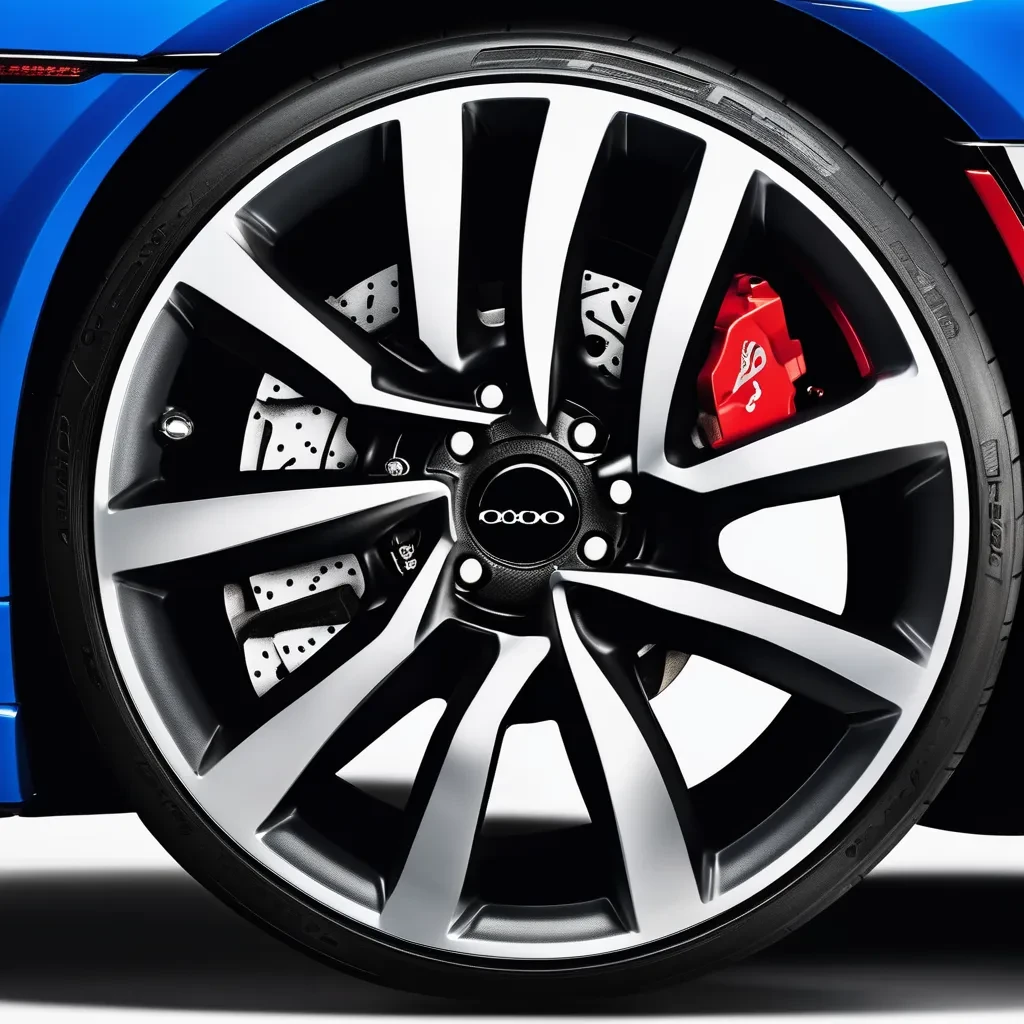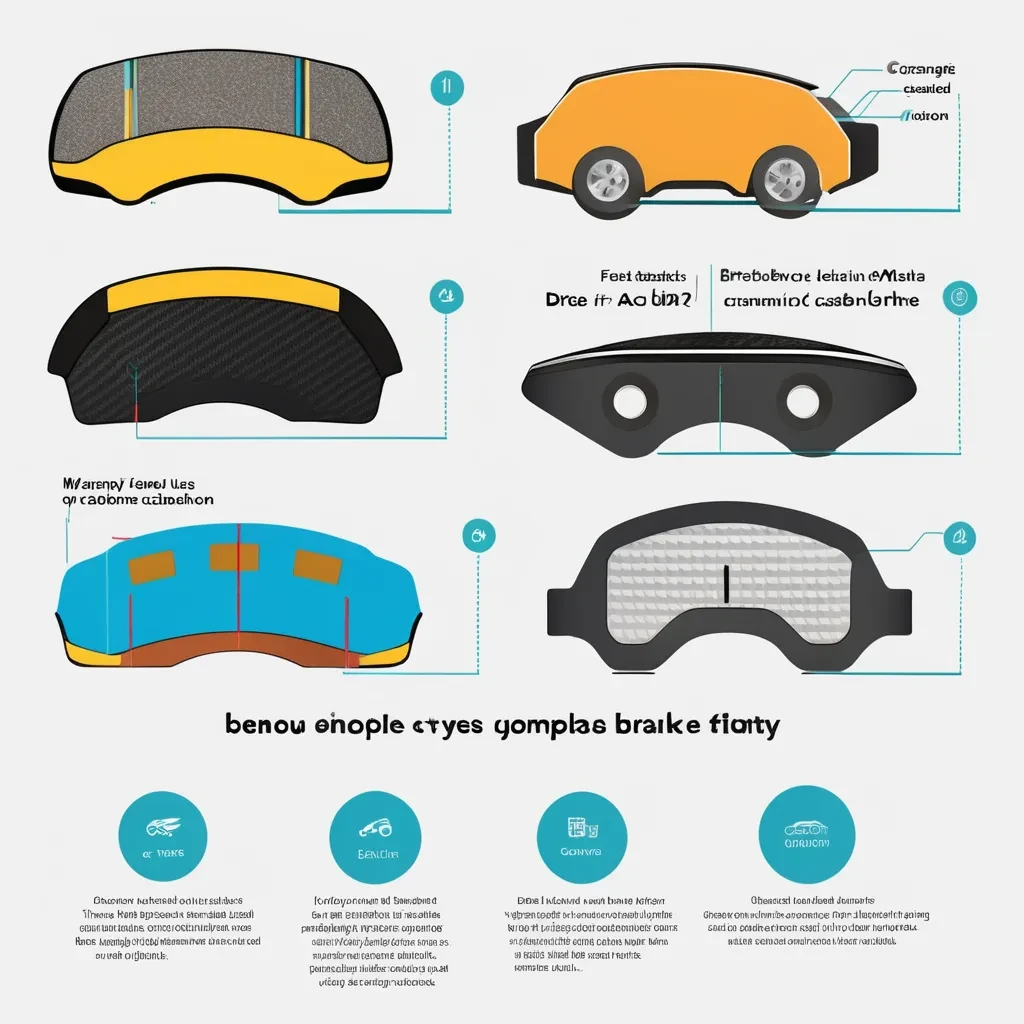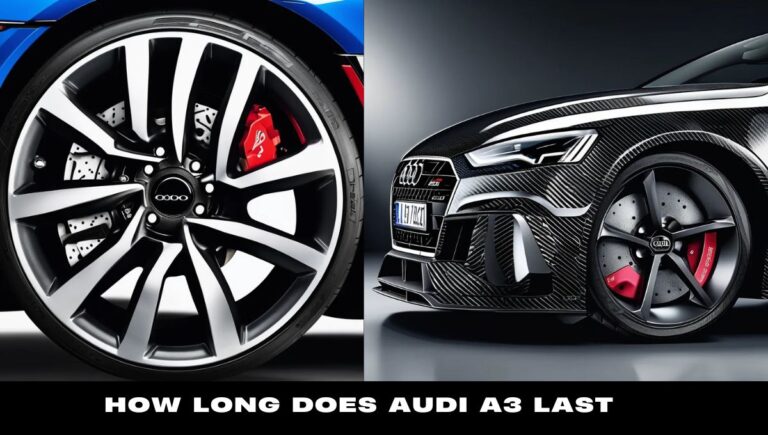What Brand of Brakes Does Audi Use: Audi uses top-quality brakes that are crucial for vehicle safety. It combines advanced technology and precise engineering to deliver reliable performance and boost driver confidence in all conditions. Audi emphasizes maximizing safety and efficiency with key parts like brake pads and advanced systems like ABS.
Audi primarily uses brakes from Brembo, TRW Automotive, Continental Automotive, and ATE (Alfred Teves Engineering) across its vehicle models.
In this article, we’ll discuss the various brands and types of brakes Audi uses across its model lineup, including why these brakes are considered some of the best in the industry. If you want more details about Audi, begin your exploration with Carsdensity.
Table of Contents:
OEM Brake Brands Used by Audi
OEM (Original Equipment Manufacturer) parts are specifically made for a vehicle by the original parts producer. For Audi, these parts are often sourced from top-tier automotive manufacturers known for creating high-quality braking systems.

These brands ensure that Audi drivers experience the best in safety, performance, and durability.
ATE Brakes
ATE (Alfred Teves Engineering) is a primary brake supplier for Audi, and it has a long history in the automotive industry. ATE is recognized for its high-performance braking systems, offering brake pads and discs that provide excellent friction and durability for everyday driving.
ATE supplies hydraulic systems and brake pads and rotors, ensuring Audi vehicles maintain consistent, reliable braking.
ATE’s focus on safety and innovation distinguishes it. It utilizes advanced materials that reduce wear and enhance braking in various weather conditions. Audi vehicles with ATE brakes offer reliable stopping power in emergencies or routine driving.
Read Also: Why Do Audis Not Have Remote Start? – Everything You Need To Know!
Brembo Brakes
When high-performance braking is needed, Brembo is the go-to brand. Brembo brakes are associated with motorsport-level performance and are found in sportier Audi models, such as the Audi RS series. These vehicles are designed for speed, requiring brakes that can handle intense heat and aggressive braking.

Brembo’s key feature is its use of multi-piston calipers and ventilated discs, which improve heat dissipation during high-speed or hard braking.
Brembo is not just about motorsport; its brakes also perform well daily, giving Audi drivers superior stopping power, minimal brake fade, and excellent pedal response.
TRW Automotive
TRW is another top supplier of brake systems for Audi vehicles. It focuses on safety and durability and offers a variety of brake pads and rotors for Audi’s popular models, such as the A4, A6, and Q5.
TRW brake components are designed for long-term reliability, which is critical for maintaining Audi vehicles’ performance and safety over time. A key strength of TRW is its commitment to advanced safety features, investing in research and development to produce brake parts that perform optimally, even in extreme conditions.
TRW is also a leader in sustainability, creating friction materials that help reduce the environmental impact of brake dust.
Read Also: Audi S4 Gearbox Malfunction You Can Continue Driving – Complete Guide!
Continental (ATE)
Besides ATE, Audi also partners with Continental, a leading automotive supplier known for its braking and electronic systems innovation. Continental provides brake parts like pads and discs, but its contribution extends further into producing electronic components that support Audi’s advanced braking systems.
This includes electronic stability control (ESC), ABS, and other driver assistance technologies that improve braking performance and safety.
Audi’s OEM and Aftermarket Brake Options
Audi’s OEM (Original Equipment Manufacturer) brakes are carefully selected to meet specific performance and safety standards. These components are designed to match the vehicle’s weight, power, and driving characteristics.
Audi brakes are known for long-lasting performance, minimal fade, and excellent braking response.
When it comes to aftermarket brake options, Audi drivers often choose brands such as:
- Zimmermann: Known for high-quality rotors, Zimmermann offers aftermarket solutions for Audi owners looking to replace or upgrade their brake systems.
- EBC Brakes: For those seeking performance and longevity, EBC offers brake pads and rotors that are suitable for both street and track driving conditions.
- Pagid Brakes: Pagid is another popular brand in the aftermarket scene. It is often used in Audi’s performance-oriented models for its track-tested durability and stopping power.
Read Also: Drive System Fault Audi – A Comprehensive Visual Guide!
Why Audi Chooses Premium Brake Brands?
Audi vehicles are renowned for their combination of luxury, performance, and safety, and the braking system plays a crucial role in maintaining this balance.
The premium brake brands Audi selects, like ATE, Brembo, and TRW, are chosen to provide the best mix of stopping power, durability, and reliability. Here’s why Audi sticks with these top brands:
Precision Engineering:
Audi’s brakes are part of a highly sophisticated machine, and they must integrate seamlessly with the car’s suspension, drivetrain, and overall design.
Premium brands such as ATE and Brembo craft their brakes to exact standards, ensuring every component fits perfectly and functions as intended.
Read Also: Audi Bluetooth Function is Currently Unavailable – Discuss with us!
Performance Under Stress:
The brakes of Audi’s high-performance models, such as the RS series and S-line vehicles, are subjected to intense conditions.
Brakes must perform flawlessly at high speeds, during heavy braking, or on rough terrain. With their multi-piston calipers and ventilated discs, Brembo brakes are engineered to withstand these extreme situations without losing efficiency.
Long-Lasting Durability:
Premium brake brands use advanced materials that minimize wear and increase the lifespan of brake components. For instance, ATE employs high-quality ceramics and composites in their pads, which wear more slowly than cheaper alternatives.
This reduces replacements, saving Audi drivers time and money in the long run.
Consistent Safety:
Safety is Audi’s top priority, and brakes are a vital part of the vehicle’s safety system. Brands like TRW focus on creating brake components that offer reliable performance even in tough driving conditions.
These brakes are designed to ensure consistent safety in wet weather, extreme temperatures, or high-speed scenarios.
Read Also: Audi q7 years to avoid – Don’t take risks!
Popular Brake Brands Compatible with Audi Models
While OEM brands like ATE, Brembo, and TRW are top choices, many Audi owners seek high-quality aftermarket alternatives. The following brands offer reliable, high-performance brake components suitable for various Audi models.
Bosch Brakes:
Bosch is a well-known name in the automotive industry and provides brake pads and rotors that work well with Audi vehicles. Bosch brake components are praised for their durability and consistent performance. For Audi drivers looking for a more affordable option without sacrificing quality, Bosch is a dependable choice.
Akebono Brakes:
Akebono specializes in ceramic brake pads, which are known for their low noise and minimal dust production. Their pads deliver excellent stopping power, making them a great option for Audi owners wanting to reduce brake dust while maintaining strong performance.
Pagid Brakes:
Pagid is a major supplier of brake pads and discs in Europe, offering components ideal for Audi vehicles. Pagid brake pads provide high-performance braking with great wear resistance and quiet operation, making them a popular choice for Audi owners looking for premium aftermarket upgrades.
Zimmermann Brakes:
Audi enthusiasts favor Zimmermann when looking to enhance their braking systems. Zimmermann’s drilled and slotted rotors improve cooling and reduce brake fade, making them an excellent option for drivers who demand more from their vehicles under intense conditions.
Read Also: Drive System Malfunction Audi – Everything you need to know!
How to Choose the Right Brakes for Your Audi?
Selecting the right brakes for your Audi depends on various factors, including your driving style, Audi model, and budget. Here’s a breakdown of how to make the best choice for your vehicle’s brakes:
Driving Style
Daily Commuting:
Standard OEM brakes from ATE or TRW should be sufficient if you mostly drive on city streets or highways. These brakes provide reliable performance in everyday driving conditions.
High-Performance Driving:
If you drive aggressively or have high-performance Audi models like the RS series, consider upgrading to Brembo brakes. Brembo provides better stopping power and heat management, which are essential for more spirited driving.
Budget Considerations
OEM vs. Aftermarket:
While OEM parts ensure perfect compatibility, they can be more expensive. If you’re looking for more affordable options, aftermarket brands like Bosch and Akebono offer high-quality brake components that work well with Audi vehicles.
Read Also: Audi Q5 Years to Avoid – Don’t take risks!
Model-Specific Requirements
Performance Models:
High-performance Audi models, such as the RS or S-line, need brakes to handle the extra power. Due to their superior performance, Brembo or Zimmermann brakes are ideal for these models.
Mainstream Models:
For standard models like the Audi A4 or Q5, OEM brakes from ATE or TRW are excellent options. They provide a good balance of performance, safety, and durability for everyday driving needs.
The Types of Brake Pads
There are four main types of brake pads. Organic brake pads are affordable and ideal for everyday driving. They provide good friction, are gentle on rotors, and create very little dust. Ceramic brake pads last longer, perform well in hot and cold conditions, are quiet, and their dust doesn’t stick to wheels.

Metallic brake pads offer even better performance, especially in high-heat conditions. They provide a firmer braking feel and resist brake fade. Carbon fiber brake pads are the top choice, known for their toughness and excellent high-temperature performance. They deliver maximum stopping power.
Although all types can be used on various cars and SUVs, ceramic and carbon fiber pads are preferred for sports cars and performance SUVs due to their superior heat dissipation.
Read Also: Which Audi Drive Select Is Best For Gas Mileage? – Let’s Explore!
Audi Brake Technology and Innovations
Audi incorporates advanced braking technology across its vehicle lineup. Some of these innovations include:
Anti-lock Braking System (ABS):
ABS is standard across all Audi models. This system prevents the wheels from locking up during emergency braking, improving steering control and reducing stopping distances.

Electronic Brake-force Distribution (EBD):
Audi’s EBD system automatically adjusts the braking force between the front and rear wheels based on driving conditions, ensuring optimal braking performance.
Brake Assist:
Audi’s brake assist system detects when the driver applies emergency braking and increases braking pressure to ensure the vehicle stops at the shortest possible distance.
Regenerative Braking:
In Audi’s electric and hybrid models, such as the Audi e-tron, regenerative braking helps capture energy during braking, which is used to recharge the vehicle’s battery. This system improves efficiency and reduces wear on the braking components.
Read Also: Audi A4 Rattle When Accelerating – Causes, Diagnosis, and Solutions!
Maintenance of Audi Brakes
Regular maintenance of Audi brakes is essential to ensure their optimal performance. Audi recommends brake inspections every 10,000 miles or during routine service intervals. During these inspections, technicians will check the brake pads, rotors, and brake fluid levels to ensure everything functions correctly.
It is also important to note that genuine Audi brake parts should always be used during replacements to maintain performance and safety.
Audi owners should avoid using inferior brake components, which may lead to premature wear and compromised braking performance.
Read Also: Audi vin decoder options list – Comprehensive Visual Guide!
Types of Brakes Audi Uses
The braking system in Audi cars varies depending on the model and its intended use. Here’s a breakdown of the types of brakes used across the Audi range:
Disc Brakes:
Audi’s majority of vehicles use disc brakes. These brakes provide better heat dissipation and stopping power than drum brakes, which is essential for maintaining performance during heavy braking.
Carbon Ceramic Brakes:
Carbon ceramic brakes are offered for high-performance models like the Audi RS line or Audi R8. These brakes are much lighter than traditional disc brakes, significantly reducing unsprung weight, which improves handling.

Carbon ceramic brakes also resist brake fade much better under extreme conditions, making them ideal for track usage.
Read Also: How Many Miles Does Audi Q5 Last? – The Latest on Vehicle Lifespan!
Ventilated Brakes:
Many Audi models have ventilated disc brakes, which feature a design that allows air to flow between the discs, helping to cool the brakes and prevent overheating.

This is particularly important in SUVs like the Audi Q7, which require robust braking systems due to their size and weight.
Frequently Asked Questions:
What makes ATE brakes a good option for Audi?
ATE brakes are a great option for Audi because they are designed to withstand daily driving stress. With advanced materials that reduce wear and ensure reliable performance, ATE brakes offer a balanced combination of safety, longevity, and braking efficiency.
Can I upgrade my Audi’s brakes to Brembo or Zimmermann?
Yes, upgrading to Brembo or Zimmermann brakes is a popular choice for Audi owners who want enhanced performance, especially for high-performance models or more aggressive driving.
Can I mix different brake brands on my Audi?
While it’s technically possible to mix brake brands on your Audi, using the same brand for both front and rear brakes is generally recommended to ensure balanced braking performance and compatibility.
Do all Audi models come with ceramic brake pads?
Not all Audi models have ceramic brake pads. Due to their superior heat management and longevity, ceramic pads are typically found on higher-end models, or those focused on performance.
How do ATE brake pads benefit Audi drivers?
ATE brake pads offer excellent durability and friction, providing smooth braking performance and ensuring longevity, making them a great choice for Audi drivers who need reliable daily use.
Conclusion:
At the end of the conclusion,
Audi uses premium brake brands such as ATE, Brembo, TRW, and Continental to ensure its vehicles’ top-level performance, safety, and durability. These high-quality braking systems are tailored to meet the specific demands of different Audi models, from daily commuters to high-performance cars.











